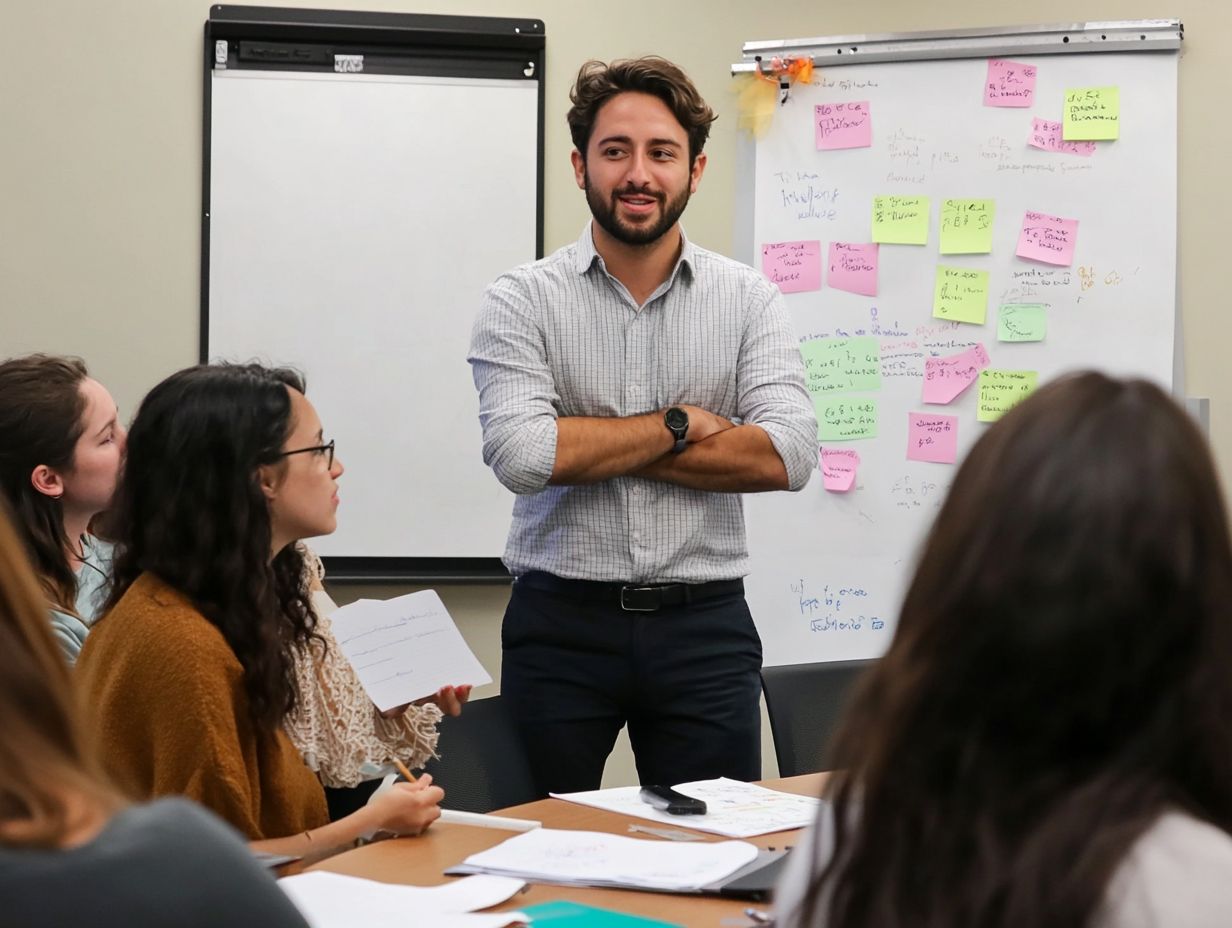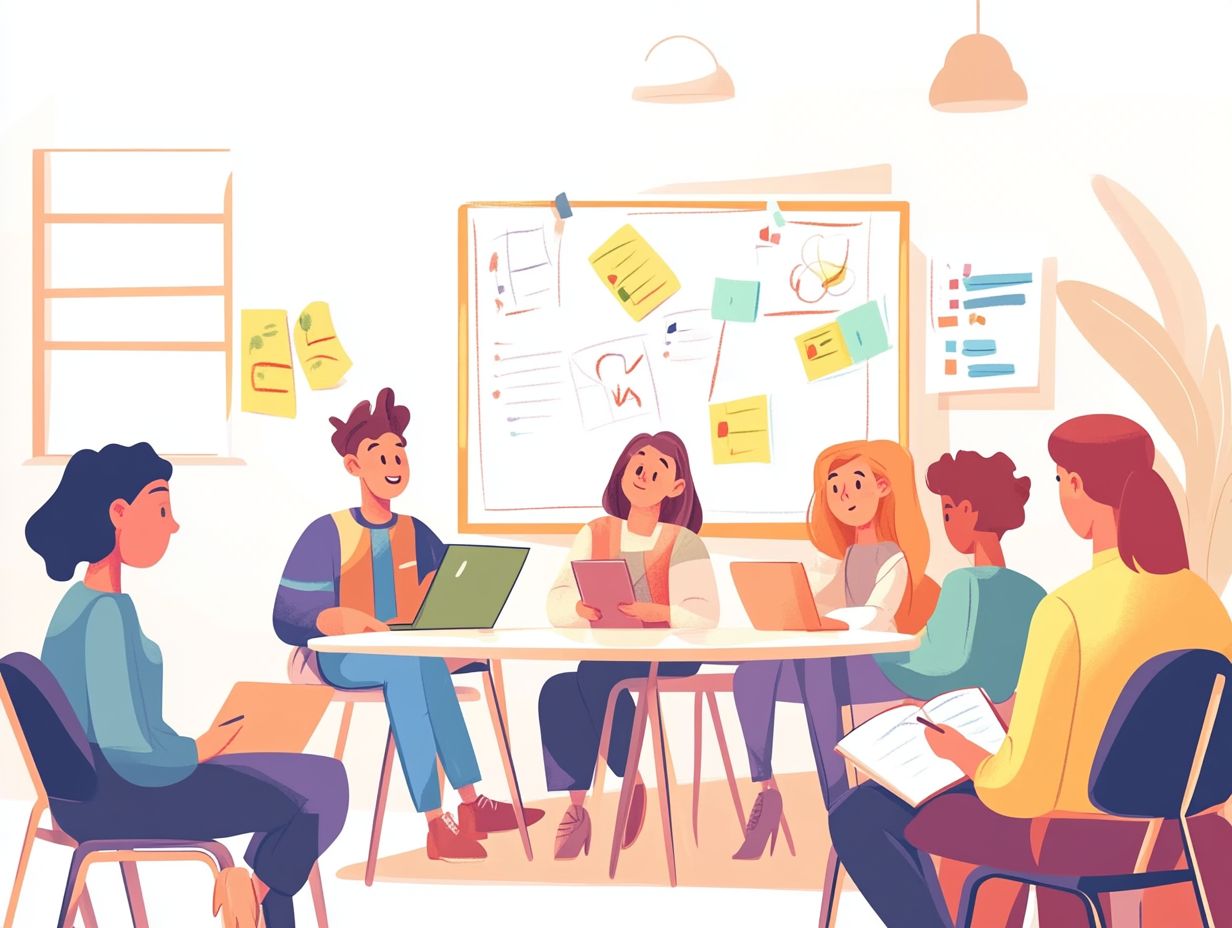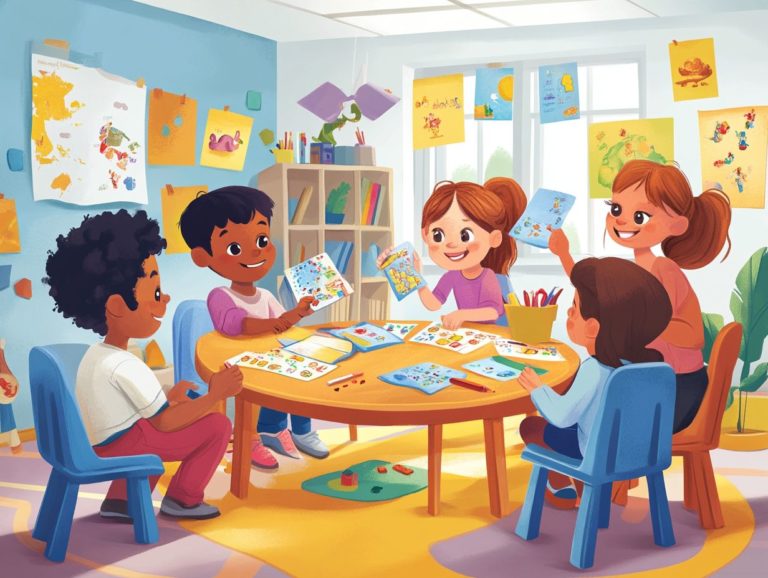7 common mistakes in language learning strategies
Embarking on the journey of learning a new language can be truly exhilarating! Yet, it often presents its own set of challenges. You may find yourself feeling stuck or frustrated, questioning why your progress seems sluggish.
Dive in to discover seven common mistakes that could be holding you back! This article highlights these errors, ranging from overly focusing on grammar to not practicing enough. It offers practical strategies to help you sidestep these pitfalls and transform your language learning experience into a successful and enjoyable endeavor.
Join us in maximizing your linguistic adventure!
Contents
- Key Takeaways:
- 1. Focusing Too Much on Grammar
- 2. Not Practicing Speaking Enough
- 3. Not Setting Realistic Goals
- 4. Not Using Different Learning Methods
- 5. Not Immersing Oneself in the Language
- 6. Getting Discouraged Too Easily
- 7. Not Being Consistent with Practice
- How to Avoid These Mistakes and Improve Language Learning?
- What Are Some Effective Language Learning Strategies?
- How Can One Stay Motivated While Learning a Language?
- What Are Some Resources for Immersing Oneself in a Language?
- How Can One Overcome the Fear of Making Mistakes in a New Language?
- What Are Some Common Myths About Language Learning?
- How Can One Make Language Learning a Part of Their Daily Routine?
- What Are the Benefits of Learning a New Language?
- Frequently Asked Questions
- What are the 7 common mistakes in language learning strategies?
- How does focusing too much on grammar hinder language learning?
- Why is it important to practice regularly when learning a language?
- Is it recommended to use only one learning method when learning a language?
- Why should you immerse yourself in the language?
- How can setting clear goals aid in language learning?
- Should learners be discouraged if they make mistakes while learning a language?
Key Takeaways:

- Don’t get caught up in perfecting grammar; focus on communication.
- Practice speaking regularly to improve fluency and pronunciation.
- Set achievable goals to stay motivated and track progress.
1. Focusing Too Much on Grammar
Focusing too heavily on grammar can lead to frustrating errors, hindering your overall language acquisition.
You might worry about every grammatical slip, turning what should be a joyful process of communication and cultural exchange into a stressful ordeal. This focus on grammar can imbalance your skill set.
As a result, your speaking and listening skills may suffer because you impose unrealistic expectations on yourself, often influenced by external resources. For example, common mistakes, such as getting subjects and verbs to match or using the wrong tense, frequently occur when your first language interferes with the new language’s structure.
When you’re fixated on achieving perfect grammar, you may hesitate during conversations, missing valuable opportunities to practice your spoken fluency. Instead of stressing over every grammatical nuance, immerse yourself in speaking and listening exercises.
This balanced approach encourages a natural flow of conversation and helps you internalize grammatical patterns intuitively. Ultimately, this makes your journey toward language acquisition both more enjoyable and effective.
2. Not Practicing Speaking Enough
Many language learners overlook the importance of practicing speaking, which can lead to significant pronunciation errors and hinder overall speaking skills.
To truly elevate your fluency, weave speaking exercises into your daily routine. This can be as simple as having conversations with a language partner, joining language exchange meetups, or even talking to yourself in front of a mirror.
Use resources like language apps, podcasts, and authentic videos to expand your exposure to natural speech patterns and cultural nuances.
Set attainable goals such as practicing short dialogues or summarizing articles aloud to build your confidence and reduce anxiety.
Confronting the fears associated with making mistakes is vital. View these moments as opportunities for growth rather than setbacks.
3. Not Setting Realistic Goals
Setting unrealistic goals can lead to frustration and discouragement. You might struggle to meet fluency targets, which can set back your progress.
Establishing achievable milestones is key to building confidence and maintaining motivation. Instead of aiming to master a language in a month, consider setting a more realistic goal, such as learning 50 new vocabulary words each week.
This approach not only expands your vocabulary but also allows you to focus on essential skills like listening, speaking, reading, and writing.
By breaking down your objectives into smaller, actionable steps with checkpoints like completing a language app module or having a weekly conversation with a native speaker you can effectively track your progress and celebrate those small victories.
These incremental achievements will ultimately pave the way for more significant accomplishments in your language learning journey.
4. Not Using Different Learning Methods
One of the biggest pitfalls in language learning is relying too heavily on a single method or resource. This can lead to vocabulary missteps and a failure to grasp the rich cultural context of the language.
Such reliance can stifle creativity and limit your ability to fully engage with the new language. Using a variety of strategies can greatly improve your learning experience.
As a visual learner, try these tools:
- Flashcards
- Infographics
- Films in the target language
If you lean toward auditory learning, explore these options:
- Podcasts
- Music
These can help you tune into the rhythm and intonation of the language, aiding in pronunciation and listening skills.
Kinesthetic learners often thrive through interactive activities such as:
- Role-playing
- Language games
These methods reinforce concepts through physical involvement. By integrating these diverse approaches, you can tackle common challenges posed by first language interference, leading to a more successful language acquisition journey.
5. Not Immersing Oneself in the Language
Failing to immerse yourself in the language can significantly impede your progress. Engaging with authentic materials and the cultural context offers invaluable insights and enhances retention.
True immersion goes beyond traditional classrooms and can be cultivated through various effective methods:
- Traveling to a country where the language is spoken allows you to practice conversational skills in everyday situations.
- Participating in discussions with native speakers, whether through language exchange meet-ups or social media platforms, can elevate your fluency and comprehension.
- Consuming media such as films, music, and books in your target language introduces you to colloquial expressions and deepens your understanding of cultural nuances.
These authentic materials become powerful tools that reinforce your vocabulary while fostering a genuine connection to the language, making your learning experience enjoyable and impactful.
6. Getting Discouraged Too Easily

Many learners get discouraged because they expect to be fluent overnight! This discouragement can hinder your overall language acquisition.
The fear of making errors can paralyze you, making you hesitant to practice speaking or engage in conversations. Embrace mistakes they’re a vital part of learning!
By shifting your mindset, focus on small, achievable milestones and celebrate progress rather than seeking perfection. Cultivating a supportive environment, practicing regularly, and indulging in enjoyable activities like language games or conversational meet-ups can help alleviate fears and keep your motivation soaring.
7. Not Being Consistent with Practice
Inconsistent practice can greatly hinder your language learning, often resulting in an uneven skill set that makes it challenging to reach your fluency goals.
To build a strong language foundation, regular practice is essential; it guides you toward mastery. By incorporating language activities into your daily life, you can enhance both retention and improvement.
Dedicating just 15 minutes a day to speaking, listening, or writing in your target language can yield impressive results over time. Leveraging language apps, tuning into podcasts, or carving out moments for conversations with peers can create a vibrant learning atmosphere.
Prioritizing consistency and implementing practical strategies can transform your fluency aspirations into a tangible reality. Are you ready to take the next step?
How to Avoid These Mistakes and Improve Language Learning?
To steer clear of common pitfalls in language learning and elevate your overall progress, it’s essential to embrace effective strategies and utilize authentic materials that provide real-world context and usage.
By exploring various learning methods like integrating multimedia resources, engaging with native speakers, and diving into immersive experiences you can cultivate a richer understanding of the language. Setting realistic goals is vital. This practice helps you maintain motivation and monitor your progress over time.
Immersing yourself in the cultural context of the language can greatly enhance your learning experience. It allows you to appreciate idioms, colloquialisms, and social cues on a deeper level.
Incorporating these approaches will help you avoid past mistakes and enable you to advance your language proficiency more effectively.
What Are Some Effective Language Learning Strategies?
Effective language learning strategies encompass various techniques crafted to enhance your vocabulary, refine your speaking skills, and promote regular listening practice.
One particularly effective method is spaced repetition, a technique that helps you remember words by reviewing them at different times.
Context-based learning offers deeper insights, enabling you to understand words within real-life situations rather than relying solely on rote memorization.
Utilizing diverse resources like FluentU, which uses authentic videos, or engaging apps like Duolingo that gamify your learning experience, can keep your motivation soaring.
Incorporating audio-focused programs such as Pimsleur can significantly improve your pronunciation and conversational abilities. This creates a comprehensive curriculum that nurtures your journey toward language mastery.
How Can One Stay Motivated While Learning a Language?
Staying motivated while learning a language is a challenge many face, but establishing clear fluency goals and immersing yourself in the cultural context of the language can significantly enhance your motivation.
To keep that enthusiasm alive, consider employing various motivational techniques, such as meticulously tracking your progress. This fosters a sense of accomplishment and allows you to appreciate just how far you ve come.
Joining language-learning communities can also be very effective. It holds you accountable and encourages you to celebrate those small victories along the way.
Engaging with resources that highlight the culture and traditions tied to the language can create a deeper connection, enriching your overall learning experience.
Finding language partners, whether online or in person, can also be incredibly beneficial. This fosters a supportive environment where you can practice and inspire each other, all while enhancing your journey toward fluency.
What Are Some Resources for Immersing Oneself in a Language?
A wealth of language resources awaits you, designed to fully immerse you in your target language. Dive into authentic materials like books, films, and music that reflect the rich cultural tapestry.
There’s even more available. You ll find a myriad of online platforms, local meet-up groups, and vibrant social media communities tailored specifically for language enthusiasts like you.
- Websites such as Duolingo and HelloTalk offer interactive features that allow you to practice speaking and writing with native speakers.
- Local groups often host conversation nights, providing you with invaluable opportunities for real-life engagement.
Podcasts and YouTube channels serve as accessible gateways, allowing you to hear everyday language in action. This enhances your vocabulary and pronunciation.
These resources deepen your understanding and cultivate a genuine connection with the culture, transforming your learning journey into a delightful and effective experience.
How Can One Overcome the Fear of Making Mistakes in a New Language?

Overcoming the fear of mistakes is crucial for language learners. It greatly enhances your speaking skills and helps you fully engage in your learning journey.
Accept that errors are not only inevitable but also valuable learning opportunities. This mindset cultivates resilience, just like successful athletes and public figures who have overcome setbacks.
Consider Michael Phelps. He faced failures early in his career but embraced those moments as essential lessons, helping him become one of the most decorated Olympians ever.
With this perspective, each stumble becomes a stepping stone to greater understanding and confidence in your abilities.
What Are Some Common Myths About Language Learning?
Many myths about language learning can set unrealistic expectations. These misconceptions may discourage you from pursuing your goals.
You might think only children can learn a new language or that fluency means perfect grammar. However, studies show that adults can successfully master new languages by leveraging their life experiences.
Many skilled speakers communicate effectively, even with grammatical slips. The idea that first language interference harms learning is misleading; recognizing similarities between languages can actually boost your skills.
By embracing a growth mindset, you can make your language-learning journey enjoyable and fulfilling.
How Can One Make Language Learning a Part of Their Daily Routine?
Integrating language learning into your daily routine can enhance your practice. This leads to substantial vocabulary growth, making the process more enjoyable.
Set specific times for focused study, whether in the morning or during lunch breaks. This consistency propels your learning efforts forward.
Use language learning apps during your commutes. This turns unproductive time into valuable practice sessions, making learning feel effortless.
Engage with a variety of resources like podcasts, audiobooks, or subtitled videos during brief moments in your day. This immediate application reinforces new concepts.
This approach ensures language learning seamlessly blends into your life, making fluency accessible and deeply satisfying.
What Are the Benefits of Learning a New Language?
Learning a new language offers many benefits, from improved cognitive abilities to deeper cultural understanding. These advantages can open doors to new opportunities.
Studies reveal that multilingual individuals may experience a 15% boost in their ability to think and adapt quickly. This enhancement often leads to sharper problem-solving skills and creativity, setting you apart in many areas of life.
In today s global job market, employers increasingly value language proficiency. Nearly 60% of organizations actively seek bilingual or multilingual candidates, recognizing the importance of language skills.
Moreover, mastering a new language fosters meaningful social connections. This allows you to engage with diverse communities, enriching your personal life and expanding your network.
This blend of personal growth, career advancement, and social engagement makes language learning a rewarding pursuit.
Frequently Asked Questions
What are the 7 common mistakes in language learning strategies?
The 7 common mistakes in language learning strategies are: focusing too much on grammar, not practicing enough, using only one method, not immersing oneself in the language, not setting clear goals, getting discouraged easily, and not seeking help when needed.
How does focusing too much on grammar hinder language learning?

Focusing too much on grammar can hinder language learning. Learners often fixate on rules and structures instead of using the language in real situations. This focus can lead to a lack of practical skills and fluency.
Why is it important to practice regularly when learning a language?
Regular practice is crucial for language learning. It reinforces new vocabulary and grammatical structures while developing fluency and confidence. Without it, you may easily forget what you’ve learned and struggle to progress.
Is it recommended to use only one learning method when learning a language?
No, using only one learning method is not recommended. Everyone learns differently, and employing a variety of methods like listening, speaking, reading, and writing strengthens different aspects of language learning.
Why should you immerse yourself in the language?
Immersion means being surrounded by the language. This constant exposure allows for practice in its natural environment and helps develop cultural understanding and fluency in real-world situations.
How can setting clear goals aid in language learning?
Setting clear goals gives you a roadmap for your language journey. It provides direction and motivation, allowing you to track your progress and celebrate achievements. Each small win keeps your motivation high!
Should learners be discouraged if they make mistakes while learning a language?
No, don t let mistakes hold you back! Learners should not be discouraged by mistakes, as they are a natural part of the learning process. Embrace them as opportunities to identify areas for improvement.





